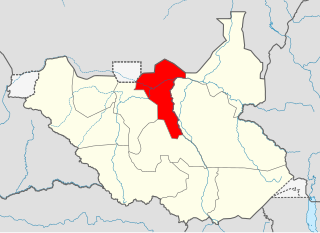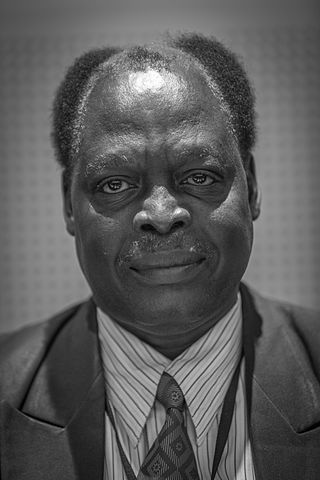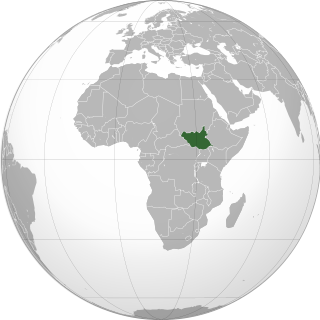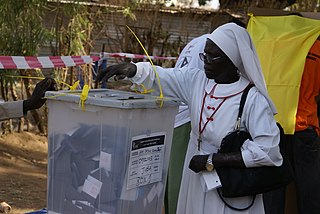
Sudan, officially the Republic of the Sudan, is a country in Northeast Africa. It borders the Central African Republic to the southwest, Chad to the west, Egypt to the north, Eritrea to the northeast, Ethiopia to the southeast, Libya to the northwest, South Sudan to the south, and the Red Sea. It has a population of 45.7 million people as of 2022 and occupies 1,886,068 square kilometres, making it Africa's third-largest country by area and the third-largest by area in the Arab League. It was the largest country by area in Africa and the Arab League until the secession of South Sudan in 2011; since then both titles have been held by Algeria. Its capital and most populous city is Khartoum.

Sudan's human rights record has been widely condemned. Some human rights organizations have documented a variety of abuses and atrocities carried out by the Sudanese government over the past several years under the rule of Omar al-Bashir. The 2009 Human Rights Report by the United States Department of State noted serious concerns over human rights violations by the government and militia groups. Capital punishment, including crucifixion, is used for many crimes. In September, 2019, the government of Sudan signed an agreement with the UN High Commissioner for Human Rights to open a UN Human Rights Office in Khartoum and field offices in Darfur, Blue Nile, Southern Kordofan and East Sudan. In July 2020, during the 2019–2021 Sudanese transition to democracy, Justice Minister Nasredeen Abdulbari stated that "all the laws violating the human rights in Sudan" were to be scrapped, and for this reason, Parliament passed a series of laws in early July 2020.
The United Nations Commission on Human Rights (UNCHR) was a functional commission within the overall framework of the United Nations from 1946 until it was replaced by the United Nations Human Rights Council in 2006. It was a subsidiary body of the UN Economic and Social Council (ECOSOC), and was also assisted in its work by the Office of the United Nations High Commissioner for Human Rights (UNOHCHR). It was the UN's principal mechanism and international forum concerned with the promotion and protection of human rights.

Darfur is a region of western Sudan. Dār is an Arabic word meaning "home [of]" – the region was named Dardaju while ruled by the Daju, who migrated from Meroë c. 350 AD, and it was renamed Dartunjur when the Tunjur ruled the area. Darfur was an independent sultanate for several hundred years until 1874, when it fell to the Sudanese warlord Rabih az-Zubayr. The region was later invaded and incorporated into Sudan by Anglo-Egyptian forces in 1916. As an administrative region, Darfur is divided into five federal states: Central Darfur, East Darfur, North Darfur, South Darfur and West Darfur. Because of the War in Darfur between Sudanese government forces and the indigenous population, the region has been in a state of humanitarian emergency and genocide since 2003. The factors include religious and ethnic rivalry, and the rivalry between farmers and herders.

Unity State, also known as Western Upper Nile, is a state in South Sudan. Unity State is in the Greater Upper Nile region. Unity is inhabited predominantly by two ethnic groups: the Nuer majority, and the Dinka minority.

OMV is an Austrian multinational integrated oil, gas and petrochemical company which is headquartered in Vienna, Austria. The company is listed on the Vienna Stock Exchange. In the 2021 Forbes Global 2000, OMV Group was ranked as the 413th -largest public company in the world.

Slavery in Sudan began in ancient times, and had a resurgence during the Second Sudanese Civil War (1983–2005). During the Trans-Saharan slave trade, many Nilotic peoples from the lower Nile Valley were purchased as slaves and brought to work elsewhere in North Africa and the Orient by Nubians, Egyptians, Berbers and Arabs.

Lesbian, gay, bisexual, and transgender (LGBT) people in Sudan face significant challenges not experienced by non-LGBT residents. Same-sex sexual activity in Sudan is illegal for both men and women, while homophobic attitudes remain ingrained throughout the nation.

Salih Mahmoud Osman is a Sudanese human rights lawyer.
Sudan has a conflict in the Darfur area of western Sudan. The Khartoum government had, in the past, given sanctuary to trans-national Islamic terrorists, but, according to the 9/11 Commission Report, ousted al-Qaeda and cooperated with the US against such groups while simultaneously involving itself in human rights abuses in Darfur. There are also transborder issues between Chad and Darfur, and, to a lesser extent, with the Central African Republic.

The South Sudan People's Defence Forces (SSPDF), formerly the Sudan People's Liberation Army (SPLA), is the army of the Republic of South Sudan. The SPLA was founded as a guerrilla movement against the government of Sudan in 1983 and was a key participant of the Second Sudanese Civil War, led by John Garang. After Garang's death in 2005, Salva Kiir was named the SPLA's new Commander-in-Chief. As of 2010, the SPLA was divided into divisions of 10,000–14,000 soldiers.

United Nations Security Council Resolution 1590, adopted unanimously on 24 March 2005, after recalling resolutions 1547 (2004), 1556 (2004), 1564 (2004), 1574 (2004), 1585 (2005) and 1588 (2005) on the situation in Sudan, the Council established the United Nations Mission in Sudan (UNMIS) for an initial period of six months.

South Sudan, officially the Republic of South Sudan, is a landlocked country in eastern Central Africa. It is bordered by Ethiopia, Sudan, the Central African Republic, the Democratic Republic of the Congo, Uganda, and Kenya, and includes the vast swamp region of the Sudd, formed by the White Nile and known locally as the Bahr al Jabal, meaning "Mountain Sea". The population was 11,088,796 in 2023, and Juba is the capital and largest city. South Sudan gained independence from Sudan on 9 July 2011, making it the most recent sovereign state or country with widespread recognition as of 2024.

Lesbian, gay, bisexual, and transgender (LGBT) people in South Sudan face legal and societal challenges not experienced by non-LGBT residents. Male same-sex sexual activity is illegal and carries a penalty of up to ten years' imprisonment. Active enforcement of the law is not pursued by authorities: No prosecutions are known to have occurred since South Sudan gained its independence in 2011. LGBT persons are met with abuse and discrimination from agents of the government and additionally face stigmatisation among the broader population.

Human rights in South Sudan are a contentious issue, owing at least in part to the country's violent history.
A coup d'état was carried out by the Sudanese Armed Forces on 30 June 1989 against the democratically elected government of Prime Minister Sadiq al-Mahdi and President Ahmed al-Mirghani. The coup was led by military officer Omar al-Bashir who took power in its aftermath; he ruled the country for the next 30 years until he was overthrown in 2019.

Women in South Sudan are women who live in and are from South Sudan. Since the Independence of South Sudan on 9 July 2011, these women have gained more power but still face issues of inequality. Many women in this area do not have adequate access to health resources and education. While these women often face inequality, there has been progress since South Sudan's official declaration of independence. In recent years, this inequality has gained national attention and people have become more interested in the issue of child marriage that this area faces. Along with this, there has started to be a focus on the very high level of maternal mortality in South Sudan. With a maternal mortality rate of 789 deaths per 100,000 live births, South Sudan has one of the highest rates in the world.
Capital punishment in Sudan is legal under Article 27 of the Sudanese Criminal Act 1991. The Act is based on Sharia law which prescribes both the death penalty and corporal punishment, such as amputation. Sudan has moderate execution rates, ranking 8th overall in 2014 when compared to other countries that still continue the practice, after at least 29 executions were reported.

The Liberal Party is a social liberal political party in Sudan.
Capital punishment is a legal penalty in South Sudan. It is covered under the Penal Code Act of South Sudan and allows for executions of individuals in the event of convictions for numerous crimes, including murder and terrorism. The sentences can be imposed by either civilian courts or the military. Between 2011 and 2018, at least 140 people have been put to death in South Sudan with hundreds more awaiting their sentence on death row, though due to a lack of reporting within the country exact numbers remain unknown. The country has faced criticism from international rights groups and multinational organizations for its use of capital punishment on juveniles. Not a party to the Second Optional Protocol to the International Covenant on Civil and Political Rights, South Sudan remains one of sub-Saharan Africa's largest users of the death penalty.
















